Filter by

Sharing cities :a case for truly smart and sustainable cities
The work makes a case for understanding cities as shared spaces and venues for collaboration; and proposes policies and practices to share cities fairly. It argues that with modern technologies the intersection of urban space and cyberspace provides an unrivalled platform for more just, inclusive and environmentally efficient economies and societies rooted in a sharing culture.OCLC-licensed ven…
- Edition
- -
- ISBN/ISSN
- 9780262329705
- Collation
- 1 online resource (x, 445 pages) :illustrations.
- Series Title
- -
- Call Number
- -

The Provisional City; Los Angeles Stories of Architecture and Urbanism
Bagaimana kota modern terbentuk melalui siklus pergolakan, pembongkaran, dan perdebatan yang tak berujung. Kota sementara adalah kota yang terus-menerus dihapus dan dihancurkan. Melalui apa yang disebut Dana Cuff sebagai "tindakan urban yang gejolak," pengembang publik dan swasta menghancurkan situs urban dan membubarkan penghuninya, menggantinya dengan visi kehidupan yang lebih baik yang tidak…
- Edition
- -
- ISBN/ISSN
- 9780262271004
- Collation
- 1 online resource (x, 380 pages) :
- Series Title
- -
- Call Number
- 307.76 CUF p
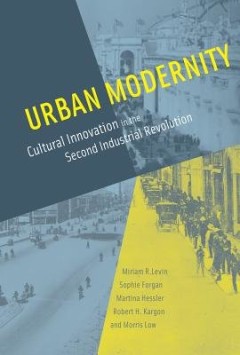
Urban Modernity: Cultural Innovation in the Second Industrial Revolution
At the close of the 19th century, industrialization and urbanization marked the end of the traditional understanding of society as rooted in agriculture. This book examines the construction of an urban-centred, industrial-based culture - an entirely new social reality based on science and technology.OCLC-licensed vendor bibliographic record.
- Edition
- -
- ISBN/ISSN
- 9780262265935
- Collation
- 1 online resource (x, 272 pages) :illustrations, maps
- Series Title
- -
- Call Number
- -
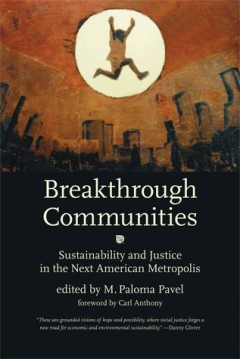
Breakthrough Communities: Sustainability and Justice in the Next American Met…
Activists, analysts, and practitioners describe innovative strategies that promote healthy neighborhoods, fair housing, and accessible transportation throughout America's cities and suburbs.OCLC-licensed vendor bibliographic record.
- Edition
- -
- ISBN/ISSN
- 9780262255479
- Collation
- 1 online resource (xli, 446 pages) :illustrations.
- Series Title
- -
- Call Number
- -
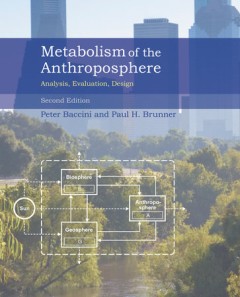
Metabolism of the anthroposphere: Analysis, evaluation, design
Over the last several thousand years of human life on Earth, agricultural settlements became urban cores, and these regional settlements became tightly connected through infrastructures transporting people, materials, and information. This global network of urban systems, including ecosystems, is the anthroposphere; the physical flows and stocks of matter and energy within it form its metabolis…
- Edition
- 2nd ed.
- ISBN/ISSN
- 9780262301329
- Collation
- 1 online resource (x, 392 pages) :illustrations, maps
- Series Title
- -
- Call Number
- -
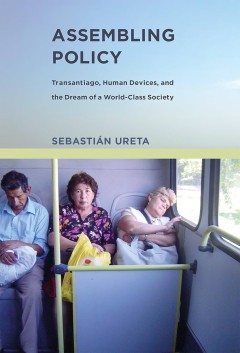
Assembling Policy: Transantiago, Human Devices, and the Dream of a World-Clas…
An examination of how human beings are brought into the planning of complex infrastructure projects, through analysis of a controversial public transportation project.OCLC-licensed vendor bibliographic record.
- Edition
- -
- ISBN/ISSN
- 9780262330954
- Collation
- 1 online resource.
- Series Title
- -
- Call Number
- -
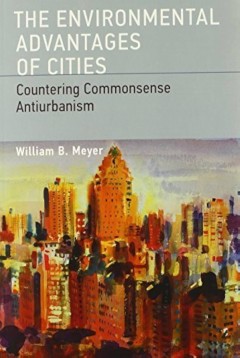
The Environmental Advantages of Cities: Countering Commonsense Antiurbanism
Conventional wisdom about the environmental impact of cities holds that urbanization and environmental quality are necessarily at odds. Cities are seen to be sites of ecological disruption, consuming a disproportionate share of natural resources, producing high levels of pollution, and concentrating harmful emissions precisely where the population is most concentrated. Cities appear to be parti…
- Edition
- -
- ISBN/ISSN
- 9780262314091
- Collation
- 1 online resource (ix, 234 pages) :illustrations, maps.
- Series Title
- -
- Call Number
- -
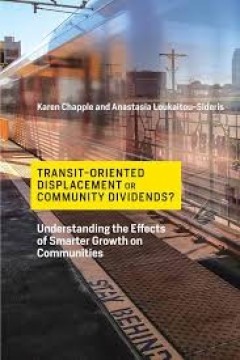
Transit-oriented displacement or community dividends? :understanding the effe…
An examination of the neighborhood transformation, gentrification, and displacement that accompany more compact development around transit. Cities and regions throughout the world are encouraging smarter growth patterns and expanding their transit systems to accommodate this growth, reduce greenhouse gas emissions, and satisfy new demands for mobility and accessibility. Yet despite a burgeoning…
- Edition
- -
- ISBN/ISSN
- 9780262352901
- Collation
- 1 online resource (368 pages).
- Series Title
- -
- Call Number
- -
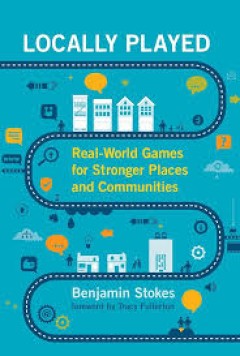
Locally played :real-world games for stronger places and communities
How games can make a real-world difference in communities when city leaders tap into the power of play for local impact. In 2016, city officials were surprised when Pok?emon GO brought millions of players out into the public space, blending digital participation with the physical. Yet for local control and empowerment, a new framework is needed to guide the power of mixed reality and pervasive …
- Edition
- -
- ISBN/ISSN
- 9780262356923
- Collation
- 1 online resource (288 pages).
- Series Title
- -
- Call Number
- -
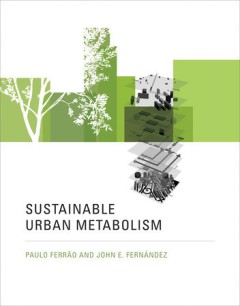
Sustainable Urban Metabolism
A unified framework for analyzing urban sustainability in terms of cities' inflows and outflows of matter and energy. Urbanization and globalization have shaped the last hundred years. These two dominant trends are mutually reinforcing: globalization links countries through the networked communications of urban hubs. The urban population now generates more than eighty percent of global GDP. Cit…
- Edition
- -
- ISBN/ISSN
- 9780262316958
- Collation
- 1 online resource (xiii, 244 pages) :illustrations
- Series Title
- -
- Call Number
- -
 Computer Science, Information & General Works
Computer Science, Information & General Works  Philosophy & Psychology
Philosophy & Psychology  Religion
Religion  Social Sciences
Social Sciences  Language
Language  Pure Science
Pure Science  Applied Sciences
Applied Sciences  Art & Recreation
Art & Recreation  Literature
Literature  History & Geography
History & Geography